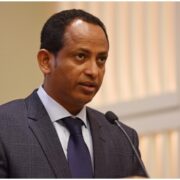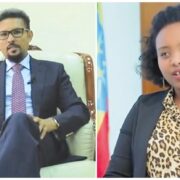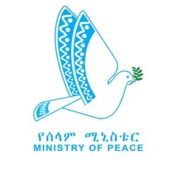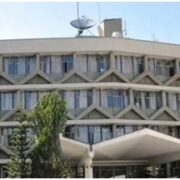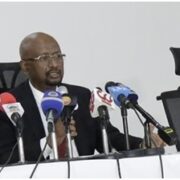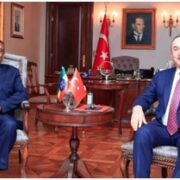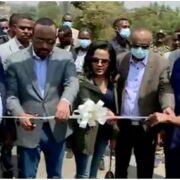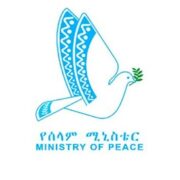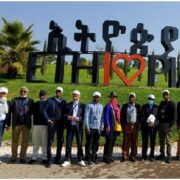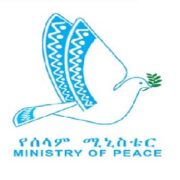ETHIOPIA IS WAXING STRONG IN THE FACE OF MULTIPLE CHALLENGES-AMBASSADORS AREGA (BY AJONG MBAPNDAH L.) (February 16, 2021)
No country in the world would have tolerated the provocation and heinous actions of the TPLF says Ambassador Arega in defence of the response of Ethiopia to crisis in Tigray
Ethiopia’s envoy to the USA Ambassador Fitsum Arega says that amidst multiple challenges, the country is waxing strong. Speaking in an exclusive zoom interview with PAV, Ambassador Arega says doomsday scenarios painted about his country in some media circles do not reflect the realities on the ground.
Defending the response of Prime Minister Abiy’s government to the crisis in Tigray, Ambassador Arega says that no country in the world would have tolerated the provocation and heinous actions of the TPLF. Ambassador Arega laments the humanitarian challenge that the war has brought but is quick to say his government is doing its level best and working in collaboration with international partners to ensure that aid is brought to the people in need and normalcy returns to the region.
On the Grand Ethiopian Renaissance Dam, Ambassador Arega said it is a public and not a government project with some five billion dollars fully funded by Ethiopians in the country and the Diaspora in the form of donations and bonds matched by the government. Ambassador Arega said his country has been forthcoming in sharing all progress and developments on the construction of the dam with Sudan and Egypt and any scepticism is uncalled for.
While relations between the USA and Ethiopia may have been ruffled due to bias in favour of Egypt by the previous administration, Ambassador Arega said he is optimistic on prospects of stronger bonds of cooperation with the Biden administration.
Despite the challenges posed by COVID-19, Ambassador Arega said his Embassy remains open and he has been working hand in glove with the dynamic Ethiopian diaspora to support recovery efforts back home. In the interview which also covers the upcoming elections, investment opportunities, and changes in the country since Prime Minister Abiy took office, Ambassador Arega shared reassuring perspectives on his country. Prime Minister Abiy has inspired millions since he came to office and reforms are still ongoing, Ambassador Arega said.
Pan African Visions: May we start with how Ethiopia is doing politically, economically and socially?
Ambassador Arega: Ethiopia has been doing very well before COVID-19 in terms of economic growth but there were serious concerns on political inclusion. Since the pandemic, Ethiopia is one of the least affected. So far more than 2 million people got tested of which 147,000 tested positive and fortunately 129,000 recovered with some 16,700 active cases. It is however sad that around 2,200 people died.
Due to the international lockdowns, trade disruptions, logistics and tourism challenges, the economy has been affected. Since Ethiopia’s economy is predominantly agricultural and the rural areas are less affected, our economic performance is still one of the strongest in Africa; last year, ending June 30, 2020 the GDP growth was 6.1%.
In terms of political stability, for over four years prior to Prime Minister Abiy assumed power there was mounting public pressure for change. As a result Prime Minister Abiy was elected as chairman of the governing party and the Prime Minister. Following his acceptance speech, hope sweep throughout the country, and in the region.
In the first few days the Prime Minister announced forgiveness, peace and unity as his central pillars for his reforms. As part of the reforms political prisoners were released, politicians and media in exile were invited into the country, state of emergency was lifted, banned media were allowed, judicial and security institutions were declared independent and the healing process was going very well with the exception of some challenges in between and the major road block coming from the TPLF, which led to the November 4, 2020 provocation and act of treason committed on the Northern command of the Federal Army.
Pan African Visions: We will get to the specifics of the conflict in a moment but let’s talk about your current functions. You have been Ambassador for a couple of years now, what is the state of ties between Washington and Addis Ababa?
Ambassador Arega: The diplomatic relations have been essentially old, to be exact one hundred and seventeen years, and last year was one of the challenging years due to President Trump’s invitation for the three countries to negotiate on the Grand Ethiopian Renaissance Dam. That did not work out the way we all wanted. It was not impartial; unacceptable proposal was coming from Egypt that was also supported by the then U.S. Administration. We all welcomed Washington as an observer, but the Treasury Department went on influencing in favour of Egypt. Except this incident our relation has been in good terms. Now, the relations are getting much better.

Bias from the Trump administration in support of Egypt did not help relations between the USA and Ethiopia says Ambassador Arega
Pan African Visions: Last year, the US suspended some aid to your country. Now, with a new administration, what efforts are being made to make sure these measures are lifted?
Ambassador Arega: The new administration is just taking shape. They have not even appointed some members of the administration. We have started contacting the relevant institutions and we are optimist that things will get better. High-level contacts have been made. We’ll be working hard to improve our relations. We are optimist that the assistance suspended on the basis of Ethiopia’s Dam will be released and also trade and investment between the two countries will increase.
Pan African Visions: The main development in the country is the conflict in the Tigray region. What is the situation there at the moment and can you give us a little background as to how things evolved to where they are today?
Ambassador Arega: As a background, when Prime Minister Abiy started sweeping political reform both in terms of widening the political space, welcoming opposition parties as well as party level reforms and when introducing economic reforms with the aim of macroeconomic stability and realigning the focus from public led to private sector led, he faced resistance from the TPLF party, the governing party of the Tigray region which directly and indirectly led the country for 27 years. The resistance grew when the election was postponed due to covid-19 reason, as per the constitution.
However, PM Abiy tried his best to peacefully resolve the tensions through dialogue, sending elders and community leaders to the Tigray region. In the meantime, ethnically and religious motivated displacements and killings were observed in different parts of the country. Then on November 4, 2020 Tigray regional forces and some federal army members of Tigrean origin the defected from the federal army launched a coordinated attack on the Northern Command of the Ethiopian Army in many military bases while they were not expecting at all. They then looted the command’s military equipment, artillery, detained and killed many in horrific situation. They admitted on their media saying they took thunder like action as pre-emptive attack.
The Ethiopian government had no option but to counter and launch a low enforcement operation. This is unacceptable act that no country on earth tolerates. So, the attack was heinous crime and we believe the international community would understand the situation.
You can compare what happened in the Washington insurrection, but this is more than that. It is a treasonous act. That’s how it evolved. During the law-enforcement operation, it took three weeks to control the capital of the Region (Mekelle) and after that, the operation was conducted to capture the fugitives, to bring them to justice.
There were close to 1.6 million people in the safety-net program that needed food aid on a regular basis before the conflict. An additional 900,000 people were added to this and after the conflict it became 2.5 million people. The federal government and the newly established provisional government in the Tigray have been partnering with international agencies to provide food and medicine to the needy.
When the TPLF forces flee away they dismantled infrastructure like bridges, telecom, power, airports etc so that the government forces won’t advance.
Now, the government is tasked with maintaining all these on top of the relief and rehabilitation activities and to date telecom and power has been restored in many cities and villages; airports have been maintained, temporary bridges have been installed so that humanitarian work can continue. There has been misinformation regarding the humanitarian activities, and this is not fair. We believe the truth will prevail.
Pan African Visions: To push back on what you described as negative news, Prime Minister Abiy won the Nobel Peace Prize and opinions have been divided. What did his government do to peacefully resolve this conflict before taking on a full-scale battle?
Ambassador Arega: it is unwise to think a Prime Minister who won a Nobel Peace Prize would not defend its country when an act of treason is committed; this is unacceptable. We can compare this with Washington when Capitol Hill was swamped by some violent demonstrators breaking the building, looting or destroying document. This was insurrection. As a result, impeachment law was invoked, perpetrators were brought to justice and the process is still continuing. What TPLF has done is more than that.
Pan African Visions: And what is your response to human rights groups and others who think in the course of trying to resolve the crisis there has been a heavy toll on innocent civilians?
Ambassador Arega: First of all, the government has made many attempts to avoid the confrontation, by sending elders, community leaders, etc. When that didn’t work after the attack the countering law enforcement operation was conducted with at most care, with calls to surrender in between the operations, to give the TPLF wanted fugitives an opportunity and minimize casualty.
There are human rights groups that escalated estimates of the casualties, refugees to Sudan, internally displaced people, people who need aid. They speculate or report based on unfounded, unconfirmed, unverified or anonymous sources.
The Ethiopian Human Rights Commission investigated Mai-Kadra, where hundreds of people were massacred while the village was under the effective administration of the TPLF. This is crime against humanity. We are open for investigation and there are also visits going on by various groups.

Since Prime Minister Abiy came to power, he has inspired millions and reforms are still alive, says Ambassador Arega
Pan African Visions: Prime Minister Abiy came to power with a reform-minded agenda. What will you say has changed in Ethiopia under his leadership?
Ambassador Arega: Since he came to power, he inspired millions and reforms are still alive. In terms of political space, now I do not know any opposition that is in exile. This was unthinkable in the past. In terms of the economy, the PM introduced what we call Home-Grown Economic Reform programme which has the agenda of sustaining the economy by way of empowering the private sector.
Improving the macroeconomic imbalances through dept management and restructuring, privatization of state-owned enterprises, including telecom, sugar industries, etc.
The major challenge so far and going forward is the impact of COVID-19 in the economy. When you talk about tourism, import-export, mining, and other industries, unless the ban on international travel is lifted, it will continue to be challenging.
So, we are focusing on agriculture and other resilient sectors. Ethiopian Airlines has been adjusting and is doing its best in COVID-19 related cargo operations. The airline has been instrumental in distributing PPEs to many African countries.
Pan African Visions: With regards to the election that will be coming up later in the year, how equipped and strong are the institutions in Ethiopia to ensure that there will be free, fair, and acceptable to all the parties?
Ambassador Arega: TheEthiopian Election Board, the main body established to conduct election and other institutions with judicial and executive power have gone through reforms and training with the aim of conducting free, fair and acceptable election. The election is scheduled for June 5, 2021 and the preparations so far as expressed by some members of the opposition parties is encouraging.
Pan African Visions: The construction of the Grand Renaissance Dam has created a lot of tensions with neighbouring countries like Egypt and Sudan. May we know why your country attaches so much importance to the project?
Ambassador Arega: The Grand Ethiopian Renaissance Dam is fully financed by Ethiopians, no loan or grant from overseas. About 5 billion US dollars have been raised by Ethiopians at home and in the Diaspora and matched by the government. We have done all the necessary studies and executed accordingly through professional support. We also involved international panel of experts to advise the three countries on their best scenarios. We also shared all required information to Sudan and Egypt.
Ethiopia is willing to negotiate in good faith with the objective of win-win cooperation. We are saying let us negotiate on the basis of the Declaration of Principles signed by the leaders of the three countries in December 2015. Therefore, the negotiation should be on the filling of the dam and the operation. However, Egypt wants to focus on water allocation with the hope to maintain what they call the “historical water rights”.
With regards to the water allocation, we have another platform, the Nile Basin Initiative which includes all the countries of the Nile. Ethiopia cannot bring the agenda of Nile Basin Initiative to the tripartite negotiation.
Ethiopia is contributing 86% to the Nile but utilizing close to zero. The Grand Renaissance Dam is not a water-consuming project. It is for generating electric power, for generation the water needs to hit the turbines and flow to downstream countries, Sudan and Egypt.
Ethiopia is more than ready to negotiate in good faith. We believe the best way to reach an agreement is to refer it to the scientific experts of the three countries. The issue is technical, and it is important not to fix technical issues by politicians, which is the case now. What should dictate us is the fact on the ground, the availability of enough water. This was the case last year and our first filling did not harm anyone in the downstream.

Ambassador Arega has been working hard with the diaspora to complement development efforts in Ethiopia.
Pan African Visions: To American and other investors out there who are curious about Ethiopia, what opportunities are available today and how is the investment climate?
Ambassador Arega: At present, the main challenge to attract investment in any country is COVID-19, though there are some exceptional sectors like ICT where it is even more attractive during this time.
In addition to the ICT sector Ethiopia is promoting privatization of Telecom and other state-owned enterprises, investment in the health sector, mining, infrastructure such as power, and post COVID-19 in many other sectors including manufacturing and agriculture.
We have recently improved our investment law and ease of doing business by introducing single-window platform for customs clearance, import-export facilitation, etc.
Pan African Visions: As we wrap this interview, maybe we ask you how things are at the Embassy. Is the Embassy open and are the borders of your country open?
Ambassador Arega: Yes, our Embassy has been open throughout COVID-19 practicing the CDC guidelines. We have consulates in Los Angeles and Minnesota. In addition to this, we commenced online services; we have online visa, online power of attorney and passport renewal services. Yes, our boarders are open and welcoming people as long as they have a negative COVID-19 test result and practice the guidelines.
We have been also mobilizing virtually the Diaspora Community. We had more than 100 virtual meetings with these groups in 41 states. We have raised useful resources both in kind and in cash through banks, on line platforms like GoFundMe. Some of the Diasporas have been active on trade and investment. They also assisted in the advocacy of the GERD and other issues that concern the US.
The government of Ethiopia has called for the members of the Diaspora to enhance their commitment to contribute more on trade and investment, and counter misinformation.
*Culled from February Issue of PAV Magazine
Click the Link Below

